Related Research Articles

Economic history is the study of history using methodological tools from economics or with a special attention to economic phenomena. Research is conducted using a combination of historical methods, statistical methods and the application of economic theory to historical situations and institutions. The field can encompass a wide variety of topics, including equality, finance, technology, labour, and business. It emphasizes historicizing the economy itself, analyzing it as a dynamic entity and attempting to provide insights into the way it is structured and conceived.

William Edwards Deming was an American business theorist, composer, economist, industrial engineer, management consultant, statistician, and writer. Educated initially as an electrical engineer and later specializing in mathematical physics, he helped develop the sampling techniques still used by the United States Census Bureau and the Bureau of Labor Statistics. He is also known as the father of the quality movement and was hugely influential in post-WWII Japan, credited with revolutionizing Japan's industry and making it one of the most dominant economies in the world. He is best known for his theories of management.
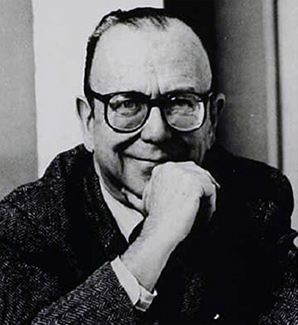
Robert L. Heilbroner was an American economist and historian of economic thought. The author of some 20 books, Heilbroner was best known for The Worldly Philosophers: The Lives, Times and Ideas of the Great Economic Thinkers (1953), a survey of the lives and contributions of famous economists, notably Adam Smith, Karl Marx, and John Maynard Keynes.
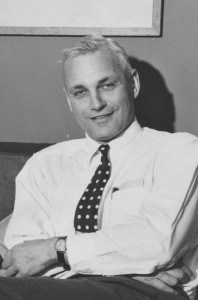
Paul Marlor Sweezy was a Marxist economist, political activist, publisher, and founding editor of the long-running magazine Monthly Review. He is best remembered for his contributions to economic theory as one of the leading Marxian economists of the second half of the 20th century.

Jagdish Natwarlal Bhagwati is an Indian-born naturalized American economist and one of the most influential trade theorists of his generation. He is a University Professor of economics and law at Columbia University and a Senior Fellow in International Economics at the Council on Foreign Relations. He has made significant contributions to international trade theory and economic development.
Institutional economics focuses on understanding the role of the evolutionary process and the role of institutions in shaping economic behavior. Its original focus lay in Thorstein Veblen's instinct-oriented dichotomy between technology on the one side and the "ceremonial" sphere of society on the other. Its name and core elements trace back to a 1919 American Economic Review article by Walton H. Hamilton. Institutional economics emphasizes a broader study of institutions and views markets as a result of the complex interaction of these various institutions. The earlier tradition continues today as a leading heterodox approach to economics.
Harry Braverman (1920–1976) was an American Marxist, worker, political economist and revolutionary. Born in New York City to a working-class family, Braverman worked in a variety of metal smithing industries before becoming an editor at Grove Press, and later Monthly Review Press, where he worked until his death at the age of 55 in Honesdale, Pennsylvania. Braverman is most widely known for his 1974 book Labor and Monopoly Capital: The Degradation of Work in the Twentieth Century, "a text that literally christened the emerging field of labor process studies" and which in turn "reinvigorated intellectual sensibilities and revived the study of the work process in fields such as history, sociology, economics, political science, and human geography."

Susan Strange was a British scholar who was "almost single-handedly responsible for creating international political economy." Notable publications include Sterling and British Policy (1971), Casino Capitalism (1986), States and Markets (1988), The Retreat of the State (1996), and Mad Money (1998).

Ha-Joon Chang is a South Korean economist and academic. Chang specialises in institutional economics and development, and lectured in economics at the University of Cambridge from 1990-2021 before becoming professor of economics at the School of Oriental and African Studies (SOAS) in 2022. Chang is the author of several bestselling books on economics and development policy, most notably Kicking Away the Ladder: Development Strategy in Historical Perspective (2002). In 2013, Prospect magazine ranked Chang as one of the top 20 World Thinkers.
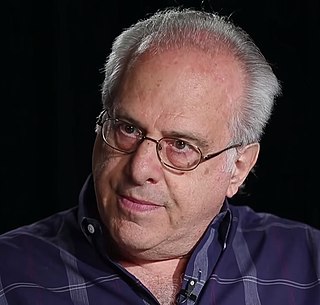
Richard David Wolff is an American Marxian economist known for his work on economic methodology and class analysis. He is a professor emeritus of economics at the University of Massachusetts Amherst and a visiting professor in the graduate program in international affairs of the New School. Wolff has also taught economics at Yale University, City University of New York, University of Utah, University of Paris I (Sorbonne), and The Brecht Forum in New York City.

Claudia Dale Goldin is an American economic historian and labor economist. She is the Henry Lee Professor of Economics at Harvard University. In October 2023, she was awarded the Sveriges Riksbank Prize in Economic Sciences in Memory of Alfred Nobel, "for having advanced our understanding of women's labor market outcomes”. She was the third woman to win the award, and the first woman to win the award solo.
Stephen Alan Marglin is an American economist. He is the Walter S. Barker Professor of Economics at Harvard University, a fellow of the Econometric Society, and a founding member of the World Economics Association.

Herbert Gintis was an American economist, behavioral scientist, and educator known for his theoretical contributions to sociobiology, especially altruism, cooperation, epistemic game theory, gene-culture coevolution, efficiency wages, strong reciprocity, and human capital theory. Throughout his career, he worked extensively with economist Samuel Bowles. Their landmark book, Schooling in Capitalist America, had multiple editions in five languages since it was first published in 1976. Their book, A Cooperative Species: Human Reciprocity and its Evolution was published by Princeton University Press in 2011.
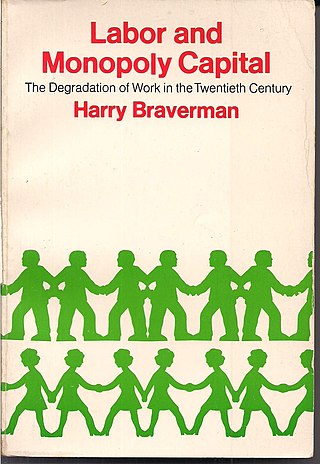
Labor and Monopoly Capital: The Degradation of Work in the Twentieth Century is a book about the economics and sociology of work under monopoly capitalism by the political economist Harry Braverman. Building on Monopoly Capital by Paul A. Baran and Paul Sweezy, it was first published in 1974 by Monthly Review Press.
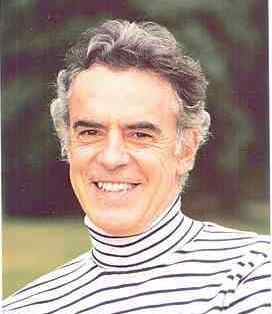
David M. Gordon was an American economist and Professor of Economics at the Graduate Faculty of the New School for Social Research. He founded the Institute for Labor Education and Research in 1975 and later the Schwartz Center for Economic Policy Analysis in New York City. Gordon worked to disseminate progressive economic ideas to the general public and to contribute to the development of a left-political movement in the United States. Gordon's work dealt mainly with discrimination and labor market segmentation. He coined the term social structure of accumulation which gave rise to an extensive body of work on the impact of political, social and economic institutions on long-term investment and growth.
Throughout modern history, a variety of perspectives on capitalism have evolved based on different schools of thought.
Michael Reich is a Polish-born economist who primarily focuses on labor economics and political economy. Currently, Reich is a professor of economics and co-chair of the Center on Wage and Employment Dynamics at the Institute for Research on Labor and Employment (IRLE) at the University of California at Berkeley. He served as director of IRLE from 2004 to 2015. In 1968, he helped found the Union for Radical Political Economics.
Crisis theory, concerning the causes and consequences of the tendency for the rate of profit to fall in a capitalist system, is associated with Marxian critique of political economy, and was further popularised through Marxist economics.
Sreten Sokić is a Serbian political scientist, economist, businessman and retired University Professor. Sokić was at the time Vice-Rector of the University of Belgrade, Vice-Rector at the Faculty of Political Science, full professor at the Faculty of Political Science in Belgrade. Sokić was the director of the Institute for Political Studies and the managing director of the Copper and Aluminum Rolling Mill in Sevojno.
Robert Miles, also known as Bob Miles, is a British sociologist. Miles has worked as a professor of sociology at University of Glasgow and University of North Carolina at Chapel Hill.
References
- 1 2 "Pay equity: equal pay for work of comparable value : joint hearings before the Subcommittees on Human Resources, Civil Service, Compensation and Employee Benefits of the Committee on Post Office and Civil Service, House of Representatives, Ninety-seventh Congress, second session". United States. Congress. House. Committee on Post Office and Civil Service. Subcommittee on Human Resources. 1983. Page 1226.
- 1 2 3 "Editorial Board". Great Plains Research. 26 (2): vi–viii. 2016. JSTOR 44685733.
- 1 2 Dunkerley, David (July 1982). "Book Reviews : Richard C. Edwards: Contested Terrain: The Transformation of the Workplace in the Twentieth Century 1979, New York: Basic Books; London: Heinemann. 262 pages". Organization Studies. 3 (3): 279–281. doi:10.1177/017084068200300303. S2CID 144357317.
- ↑ Watkins, Alfred J (March 1980). "Edwards, Contested Terrain: The Transformation of the Workplace in the Twentieth Century (Book Review)". Social Science Quarterly. 60 (4): 717. ProQuest 1291580431.
- 1 2 3 4 5 "Edwards named director of Center for Great Plains Studies". University of Nebraska-Lincoln (Press release). 29 November 2011.
- ↑ "Richard Edwards | Nebraska Authors". nebraskaauthors.org.
- ↑ Edwards, Richard (17 November 2003). "J.D. Edwards program deserves Excellence money, not criticism". JournalStar.com.[ non-primary source needed ]
- 1 2 3 Leverett, Taylor (February 24, 2023). "UNL Professor writes book on The First Black Migrants". KHGI.
- 1 2 Parry, Bruce E. (1984). "Review of Segmented Work, Divided Workers: The Historical Transformation of Labor in the United States". Eastern Economic Journal. 10 (1): 99–103. JSTOR 40324897.
- 1 2 Devine, Jim (December 1985). "Book Reviews: Understanding Capitalism: Competition, Command, and Change in the U.S. Economy". Review of Radical Political Economics. 17 (4): 128–131. doi:10.1177/048661348501700409. S2CID 153388384.
- ↑ "Announcements". German Politics & Society (12): 60–69. 1987. JSTOR 23735001.
- ↑ Marshall Medoff. "The Ranking of Economists". Journal of Economic Education. 1989. 410.
- 1 2 Revitte, John L. "Rights at Work: Employment Relations in the Post-Union Era". Labor Studies Journal. 20: 51.
- ↑ "Edwards contributes to Obama inaugural volume". University of Nebraska–Lincoln (Press release). 8 January 2013.
- 1 2 Edwards, Richard (5 July 2018). "Opinion | The disappearing story of the black homesteaders who pioneered the West". Washington Post.[ non-primary source needed ]